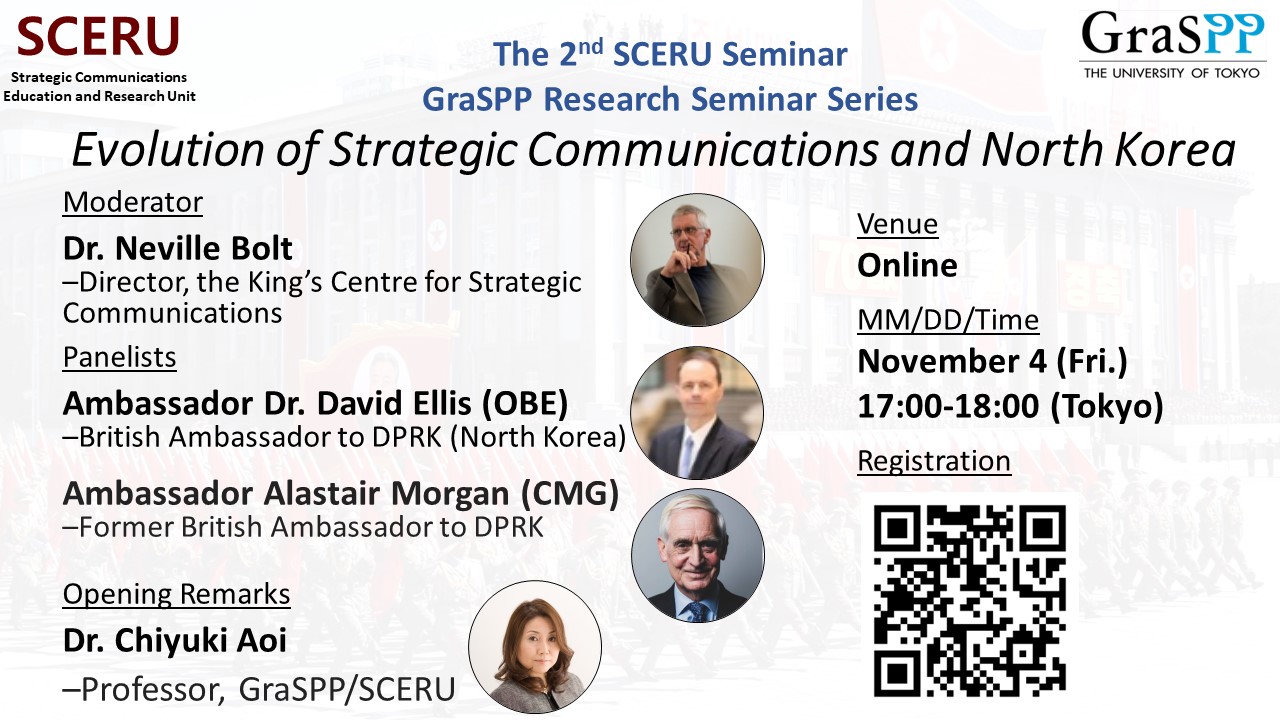Evolution of Strategic Communications and North Korea

Details
| Type | Lecture |
|---|---|
| Intended for | General public / Enrolled students / International students / Alumni / Companies / University students / Academic and Administrative Staff |
| Date(s) | November 4, 2022 17:00 — 18:00 |
| Location | Online |
| Entrance Fee | No charge |
| Registration Method | Advance registration required
Please register here. A zoom link will be sent out via email to those who registered by the day before this event. |
| Registration Period | October 25, 2022 — November 3, 2022 |
| Contact | graspp_eventinfo@pp.u-tokyo.ac.jp |
The Second SCERU Seminar/GraSPP Research Seminar Series
Evolution of Strategic Communications and North Korea
Graduate School of Public Policy (GraSPP), The University of Tokyo, is pleased to invite you to the upcoming GraSPP Strategic Communications Education and Research Unit (SCERU) Seminar/GraSPP Research Seminar that will be held on November 4 2022 via Zoom.
Synopsis
North Korea has traditionally exported propaganda based on the Soviet model. In recent years, the North Korean regime has experimented with new platforms and messages designed to appeal both to domestic and international audiences in an increasingly contested stratcoms environment. The evolving uses of communications by the DPRK raises the question of whether non-democracies may resort to Strategic Communications or if the latter is the sole preserve of democracies. Dr David Ellis, British Ambassador to the Democratic People’s Republic of Korea (DPRK), examines the North Korean regime’s embrace of new technologies, the lessons it has learned from other regimes, and whether DPRK is developing stratcoms or simply producing more modern propaganda. Alastair Morgan, former British Ambassador to DPRK and current Ushioda Scholar (Tokyo College) and Lecturer at GraSPP, will respond to David’s arguments and critically assess the DPRK’s differentiation and communication of its messaging towards domestic and foreign target groups.
Date and Time
November 4th, 2022, 17:00-18:00 (Tokyo); 8:00-9:00AM (London); 9:00-10:00AM (CET)
Language
English
Introductory remarks
Chiyuki Aoi, PhD Professor, GraSPP/SCERU, Editorial Board Member, NATO SC COE/Associate Fellow, King’s Centre for Strategic Communications.
Panelists
Dr David Ellis OBE is His Majesty’s Ambassador to the Democratic People’s Republic of Korea. Prior to his current position, he was Minister and Deputy Head of Mission at the British Embassy in Tokyo (2016 to 2020), responsible for advancing UK-Japan relations on political and security issues. From 2011-2015, he was Minister Counsellor (Political) at British Embassy Beijing, (2011 to 2015), where he was responsible for leading political teams covering Chinese domestic politics, human rights, and foreign and security policy. Prior to this, he served for nearly twenty years at the Foreign, Commonwealth and Development Office, including as Deputy Head of the Afghanistan Group, and Deputy Head of Far Eastern Department. He has a PhD in 17th-century Chinese literature from the University of Edinburgh.
Alastair Morgan CMG is a Tokyo College Ushioda Fellow of the University of Tokyo, affiliated with GraSPP. Previous to his current position he was a regional security expert and Coordinator of the UN 1874 Panel of Experts on DPRK sanctions (2019 – 2021). Prior to that, he served for over thirty years as a British civil servant and diplomat, including as British Ambassador to the Democratic People’s Republic of Korea from 2015 -2018. He has also been appointed a Senior Visiting Research Fellow of the War Studies Department, King’s College London.
Moderator
Dr Neville Bolt is the Director of the King’s Centre for Strategic Communications (KCSC), a leading global centre of expertise in strategic communications, and a Senior Fellow at SCERU. He is a Reader in Strategic Communications and Convenor of the Master's programme in Strategic Communications at the Department of War Studies, King’s College London. Bolt is Editor-in-Chief of Defence Strategic Communications, the academic journal of the NATO Strategic Communications Centre of Excellence. Much of his career was spent as a television journalist and producer-director at the BBC, ITV, and CBC (Canada). Working in news and current affairs, he specialised as a producer of war zone documentaries, covering conflicts in Africa, Latin America, the Middle East, and the Indian subcontinent. Later he created strategic communications campaigns for Britain’s Labour Party; Amnesty International; the African National Congress (ANC)/Anti-Apartheid Movement. He served too as a communications advisor to UEFA Champions League football. His book The Violent Image: Insurgent Propaganda and the New Revolutionaries (Columbia University Press) was published in 2012; 2nd edition, 2020. It received the CHOICE 'outstanding academic status award' in 2013.
About the Unit
The Graduate School of Public Policy (GraSPP) at the University of Tokyo, with European Union (EU) support, has established a Strategic Communications Education and Research Unit for conducting a collaborative programme on research and education on Strategic Communication. The Unit will organize teaching, public research, and professional seminars on Strategic Communications, with a particular focus on bringing together perspectives and professional experiences from Europe and Japan. Through the work of the programme, Japanese and European perspectives on Strategic Communication can be shared, reinforcing the EU-Japan strategic partnership, and supporting efforts to overcome common problems including the rise of disinformation and foreign information manipulation and interference (FIMI).






